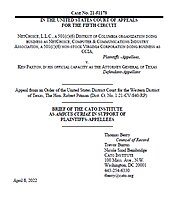NetChoice, a trade association of online businesses, sued to block the law on First Amendment grounds, among other claims. A federal district court in Texas ruled in favor of NetChoice and preliminarily enjoined the law. Texas appealed to the Fifth Circuit, and Cato has now filed an amicus brief supporting NetChoice.
In the brief, we explain the core irony of Texas’s efforts to ostensibly prevent the “silencing of conservative viewpoints” by social media companies. To defend its law, Texas has in fact adopted a politically progressive and historically-discredited legal theory. This theory argues that the First Amendment allows the government to seize control of private media platforms in order to guarantee that they host the speech the government prefers. In fact, this is a distortion of the First Amendment, which only protects private speech from government censorship.
By adopting this theory, Texas’s law violates platforms’ First Amendment rights. Social media platforms exercise traditional, First Amendment-protected editorial functions over the content they host. This editorial right is not contingent on a platform’s prior exercise of the right, nor on whether a platform aims to present a “unified” message. Nor may Texas deprive the platforms of their protected editorial decisions by arbitrarily declaring them common carriers.
Further, Texas’s account of platforms’ discrimination against conservative users is based on a fundamental misunderstanding of how content moderation at scale works. Large social media platforms receive a staggering amount of content each day, which is processed through error-prone artificial intelligence and through inevitably subjective human moderators. “Incorrect” content removals happen millions of times per day to users representing every conceivable ideology. Texas’s claim that social media platforms are targeting conservatives is unsubstantiated.
Whatever disagreement one may have with the editorial choices a particular platform has made, shifting control over those choices to the state is not the answer. The First Amendment protects private platforms’ rights to moderate content. Interfering with this right will chill speech by encouraging platforms to remove entire categories of content to avoid liability for “viewpoint discrimination.” It will also undermine property rights by forcing platforms to host users they would otherwise exclude. And it will deprive the public of beneficial use of the platforms. For these reasons, the Fifth Circuit should affirm the district court’s preliminary injunction.




